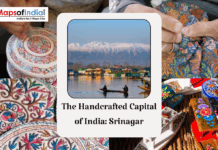If you are in your thirties or above, then you must have heard a patriotic song on the DD channel – ‘mile sur mera tumhara’ – promoting national integration. India is a diverse nation in terms of culture, language, religion, caste, people, cuisine and everything. So, after independence, national integration was one of the main tasks for political leaders. The concept became further important, as various states in India were formed in 1956 on the basis of languages. Moreover, some of the states like Punjab and Jammu and Kashmir even started asking to become a separate country though these were an integral part of India.
If we peep into the history of ancient India, then religion played an important role in uniting the people and the nation. Common devotion created the feeling of affinity that helped in the integration of the nation. Two main languages, Sanskrit and Pali, had also played the same role. But with the invasion of foreign rulers, more religions and languages got added in the country leading to much greater diversification than ever. Feelings of jealousy, and religion-based separation started raising its head and disturbed the country’s unity. With the British rule came their ‘divide and rule’ policy. They created a difference between Hindu and Muslims on the basis of religion and that was the greatest setback to India’s national integration. Along with this, just for the sake of rule, differences between rich and poor, rural and urban, upper and lower had also been created. But, in spite of all this, people were one and we got Independence because of our national unity.
After independence the government favored tolerance, secularism and national integration. The constitution of India tried its best to provide equal opportunities to its entire people irrespective of caste, religion, creed, place of birth etc. Hindi was made an official language of the country. In spite of all the efforts, still there is a gap and the spirit of unity is evaporating quickly. Loyalty to religion and language is more important than devotion to the motherland. The most serious threats to the national integration of India are – linguistic differences, communalism and regionalism. Also issues like intolerance and selfishness are acting as threats to unity.
How to promote national integration in India?
To achieve this goal, every citizen of India must first identify himself or herself as Indian not as Bengali, Punjabi, south Indian or north Indian. At present, the identification is on the basis of state, language, religion, caste and culture but not at all on the basis of country. Being Indian is our common identify and we must say it proudly.
Communalism is the greatest challenge that divides our country. Communalism was greatly encouraged during British rule as they wanted to rule our country with their ‘divide and rule’ policy. Then in 1947, with the Partition, communalism played its ugly role again, killing thousands of innocent peoples. So, to promote national integration and unity, one must leave communalism and think above his or her religion. We need to promote communal harmony.
Then we must understand that language is just a way to communicate but it is not meant to define any personality. I am born in a particular family so I have acquired all the traits of that family. But what if I were born in another family and another religion? I must have followed that faith and spoken that language. So, it is your birth that defines your religion, not you. We must respect each other’s language and religion. Due recognition to several languages has been given by in our Constitution. But, we as individuals, recognize just one language that we speak, ignoring all other languages. As a responsible citizen we must respect every language that is spoken in India
Since childhood, kids should be taught that they are Indians and deep sense of patriotism must be developed.
We must recognize that India is a diverse nation having different religions, languages, dresses, food, etc. To promote national integration in India, there should be a respect for diversity. All these are nothing but just people’s mindsets. We think and act the way our society wants us to think and act. But all the societal dogmas need to tackled and examined so that we can follow the right path. Education plays an important role in changing the mindset of the people. Along with education that is provided in schools, it is the duty of the parents to guide their kids in the right direction. Parental education needs to be monitored regularly. Parents must work on communal harmony and teach their kids the importance of national integration and unity.
National integration is actually a harmonious situation that binds the people of India together. The nation is built by its people so all the people must live in unity for the development of the nation as a whole. We must have a common identity, as Indians, to promote national integration.



